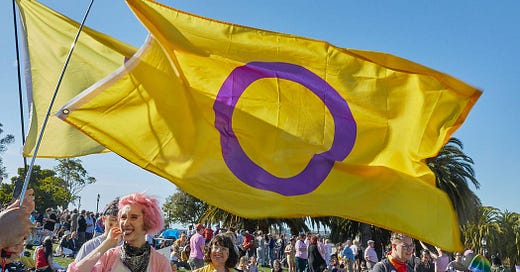Intersex folks need more love
Intersex folks have been widely misunderstood over the years and have been nothing short of mutilated as an attempt for doctors to decide a fate not up to them.
Controversies have arisen over decades of a greater societal identity crisis and whether or not they deserve a spot in the LGBTQ+ acronym.
—
The first question any new parent asks… “Is it a boy or a girl?”
What if it’s neither?
—
What does it mean to be intersex?
The term “intersex” loosely defines an array of atypical developments of one’s sex at birth. It can be abnormalities of extremities and conditions that would otherwise classify someone outside of the typical binary. These conditions can also affect one’s internal functions.
The American Psychological Association (APA) lists a few other examples of this, including:
• External genitals that cannot be easily classified as male or female
• Incomplete or unusual development of the internal reproductive organs
• Inconsistency between the external genitals and the internal reproductive organs
• Abnormalities of the sex chromosomes
• Abnormal development of the testes or ovaries
• Over- or underproduction of sex-related hormones
• Inability of the body to respond normally to sex-related hormones
Another term that may have been used for intersex folks is those who live with “disorders of sex development” (DSD). It is said to occur in one of every 1,500 to 2,000 people, according to the APA.
“Because we expect everyone to be identifiably male or female, the parents and family members of babies born with ambiguous genitals are usually eager to learn what condition the child has, so that sex assignment can occur without delay,” the APA article read. However, immediate surgery is not always necessary.
These decisions ultimately lie on the parents to weigh the state of their child as one sex or the other depending on which one they “choose,” but how often do they consider the fluidity of their kids’ identity?
InterAct, an organization supporting the rights of transgender and intersex folks, notes that intersex folks can identify as cisgender sometimes depending on their living conditions growing up and the stereotypes they may have been exposed to from a young age.
Do intersex folks belong with the LGBTQ+ community?
Intersex people oftentimes face similar barriers to those seeking gender-affirming care and rights, especially in the U.S. The idea that’s been argued over generations — whether there are only two genders — eats at an acceptance of oneself and creates a common goal between intersex people and those in the LGBTQ+ community seeking gender-affirming care or fall within the greater spectrum.
In fact, some studies over the past few years have identified that a large number of people who are intersex identify as “non-heterosexual.”
The Oxford University LGBTQ+ Society also notes that some intersex people might consider transitioning at a later stage in life after traits may begin showing up after puberty, and therefore might identify as transgender.
Conversely, it is not uncommon for intersex folks to remain androgynous and not adhere to a single gender.
“Intersex people may face lots of similar difficulties to trans people, as their physical appearances don’t always resemble binary genders like cisgender or dyadic (a term for a non-intersex person) people, and they may be perceived as transgender,” OuLGBTQ+ Society notes. “However, there are also experiences which are unique to being intersex. Because being intersex is not very common and the identity is not well known, intersex people are often quite isolated and may lack a sense of community. There is very little representation of intersex people in the media, and intersex is rarely included in sex education, which further contributes to the marginalization of intersex people.”
Intersex folks are not only a perfect example of not taking anybody at face value by their appearances, but also deserve love and appreciation from the rest of the community and the world.
We see you.
Help celebrate our intersex friends not only every day but also on the Intersex Awareness Day October 26 and International Intersex Day of Remembrance November 8.
If you liked this article, you may also like these sites:
https://interactadvocates.org/faq/intersex-lgbtqia/
http://www.intersexinitiative.org/articles/lgbti.html
https://www.hrc.org/resources/understanding-the-intersex-community
https://www.americanprogress.org/article/key-issues-facing-people-intersex-traits/
https://intersexionfilm.com/




